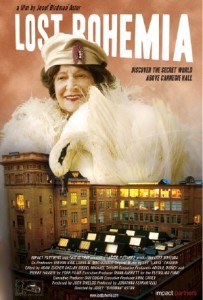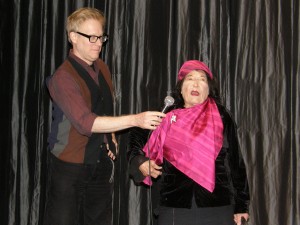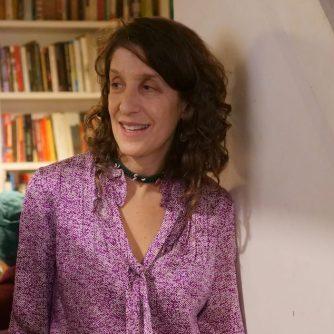 Directed by Josef Astor
Directed by Josef Astor
Produced by Jody Shields & Jonathan Ferrantelli
Released by Impact Partners/This Is That
USA. 77 min. Not Rated
The list of occupants at the Carnegie Hall Studios, right above the historic concert hall, reads like a who’s who from yesteryear: Marlon Brando, Isadora Duncan, Leonard Bernstein, and the Actors Studio, to name just a few. Living there since 1985, photographer Josef Astor—a relative youngster compared to most of his neighbors—roams the halls of the 160-unit building videotaping his elders to record the studios’ legacy. The visual quality might not always be as slick as other contemporary documentaries, but Mr. Astor captures the irresistible charm of many of these eccentrics. However, his original objective morphs into a different project entirely once eviction notices are plastered on doors in 2007. In a typical move, the landlord, the Carnegie Hall Corporation, decides to demolish these late-19th century individually designed spaces to make way for offices.

Among the artists being sent into exile are acting coach Robert X. Modica, pianist Donald Shirley, New York Times fashion photographer Bill Cunningham (the subject of Richard Press’s recent documentary “Bill Cunningham New York”, a film which also crosses paths with Mr. Astor), and, perhaps most memorable of all, photographer Editta Sherman, aka The Duchess of Carnegie Hall. When this reviewer caught a screening of “Lost Bohemia” at the DOC NYC festival last November, Ms. Sherman made an appearance during the Q&A that followed. At 96 years old, she’s still funny and in reasonably good shape. It’s her recollections and her ability to effortlessly connect to her friends and neighbors that gives “Lost Bohemia” so much heart.
There is one point where it looks like the studios might be saved, when one of Mr. Modica’s former students, John Turturro, takes center stage for a news press conference. But it’s not long before we see that the demolition is a fait accompli. The loss is all the more tragic since the studios and Carnegie Hall, financially broke in the 1950s, were in danger of being replaced by a modern tower but saved in the 11th hour. But this time, it’s the management of Carnegie Hall that is the villain.
Mr. Astor, who has inserted himself into almost every moment of “Lost Bohemia” though rarely visible, doesn’t really provide the heft of an investigative crusader—much of the legal maneuvering is only generally covered. Nevertheless, it will be difficult to avoid tears or feeling angry while watching these heroic residents, who ought to be enjoying their final years in peace, being forced from the only homes they know.
Article originally appeared: http://www.film-forward.com/lostbohe.html





